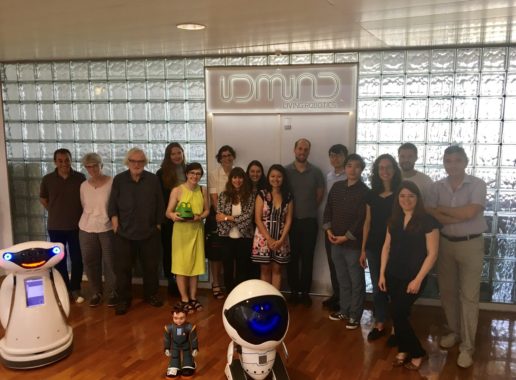At October 3rd ID Mind has recieved in its headquarters, at Centro de Incubação e Desenvolvimento (LISPOLIS) a reunion of the European Project DE-ENIGMA (www.de-enigma.eu), in which ID Mind is partner.
This is a project focused on autistic children, with the premise that children with autism perceive a humanoid robot as being less complicated, less threatening, and more comfortable to communicate with than humans. Research has demonstrated that the best treatments are early and specialized behaviour-based therapies that helps people with autism to develop skills to cope with the individual challenges they face.
The overall aim of the DE-ENIGMA project is to realize robust, context-sensitive, multimodal and naturalistic human-robot interaction (HRI) aimed at enhancing the social imagination skills of children with autism.
This extends and contrasts considerably to the current state of the art in existing technological solutions to machine analysis of the facial, bodily, vocal and verbal behaviour that are used in (commercially and otherwise) available human-centric HRI applications.
Realising an on-going effective dialogue between the child and the robot as part of a therapeutic process to teach the children socioemotional skills such as recognising and displaying appropriate emotions and social behaviours in relevant contexts also requires effective robot behaviour planning and execution.
The design of effective robot behaviours for the target user group as well as maintaining a social dialogue for the purpose of developing the children’s skills over the longer term is a more personalised and long-term oriented effort than has previously been realised. This goes beyond state of the art of longer-term interaction or agent-based therapies which currently do not involve adapting behaviours as part of an autonomous assessment loop of increasing user skill development.
The consortium is a partnership made up for various entities: university research departments in the field of computer science and psychology, non-governmental organisations focusing on autism and a company working in the field of robotics.
The project coordinator, Universiteit Twente (UT) from the Netherlands, works closely with all the other partners: Imperial College of Science Technology and Medicine (ICL) from the United Kingdom, Universitat Passau (UP) from Germany, Institute Of Mathematics Simion Stoilow Of The Romanian Academy (IMAR) from Romania, University College London (UCL) from the United Kingdom, Savez udruzenja Srbije za pomoc osobama sa autizmom (SSA) from Serbia, Autism-Europe AISBL (AE) from Belgium and IDMIND – Engenharia De Sistemas LDA (IDM) from Portugal.
Learn more here.
